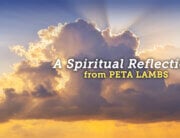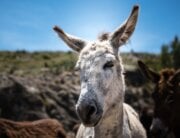We don’t want to be a downer, but there are some Christmas traditions in the church that need to be replaced—and pronto. Happily, many compassionate Christians are already extending the celebration of Christ to all God’s creatures and finding new ways to demonstrate compassion, generosity, and love during the holy season.
1. Animal Donation Programs
Animal-donation programs such as those run by Heifer International and Oxfam do not provide a sustainable solution for global hunger. Grazing animals often cause topsoil runoff and land degradation, which can contribute to drought, leading the environmental group World Land Trust to call these programs “environmentally unsound and economically disastrous.”
An exposé of a program in India that gave cows to impoverished farmers noted that the “beneficiaries” have a difficult time offering even the most basic care to the animals who have been forced upon them. Having another mouth to feed often adds to a family’s burden, and many animals suffer from horrible neglect, including malnutrition, dehydration, a lack of veterinary care, and a lack of shelter from the burning midday sun or freezing nighttime temperatures.
Tell your friends and family to avoid animal-donation programs and instead consider supporting sustainable, animal-friendly organizations that work to end hunger, such as The Fruit Tree Planting Foundation, Food for Life Global, VEGFAM, and Feed My Starving Children. Another way to aid poor families is to donate to the PETA-supported program Animal Rahat, which gives free veterinary care to working animals in India who are lame, sick, or injured.
2. Holiday Displays With Live Animals
Animals used in public displays such as live Nativity scenes are denied everything that is natural and important to them. They are hauled from venue to venue, often traveling great distances in cramped trailers or train cars in all weather conditions. When they aren’t on the move, they’re chained or confined to tiny holding pens, without ever being able to experience true kinship. Over the years, animals used in these sorts of displays have been beaten, mauled, attacked by dogs, and killed by cruel people. Others, frightened and confused, have broken away from the displays, only to be hit and killed by cars. At a New York garden center display, one sheep suffered from internal bleeding after being battered by other animals in his pen. In another incident, a frightened camel jumped from the back of a trailer traveling at full speed down a highway. A donkey used in a live nativity also died after a very large man sat on him. Understaffed and overburdened animal control departments don’t have the resources to ensure the well-being of these animals, leaving them utterly defenseless and making our stand against this abuse vitally important.
Live Nativities are a beautiful way to bring your church community together to commemorate the birth of Jesus, but let’s leave animals in peace and make sure we’re using only willing human actors.
3. Eating Ham at Your Holiday Meal
More than 90 percent of pigs raised and killed for food in the U.S. spend their entire lives in cramped, filthy warehouses under the constant stress of intense confinement. Mother pigs (sows) spend most of their miserable lives in tiny gestation crates that are too small for them to turn around in. Piglets are torn away from their distraught mothers after just a few weeks. Their tails are chopped off, the ends of their teeth are cut off with pliers, and the males are castrated, all without any painkillers to ease their suffering. When they are still very young, they are loaded onto a crowded truck—with hardly any protection from the elements and without any food, water, or place to relieve themselves—and sent to the slaughterhouse, where, as a result of improper stunning methods, many are still alive and able to feel pain when their throats are slit and they are dunked into scalding-hot water tanks meant to remove their hair or feathers.
It’s easy to celebrate a vegan holiday. We’ve got tips for you here, here, and here.
4. Buying Animals From Breeders or Pet Stores to Give as Gifts
Although inviting new animal friends into your home may be exciting, it’s a decision that must be carefully considered and researched since adopting a puppy or kitten is a 10- to 20-year commitment! And when considering the expansion of your family, it’s critical to remember that there is no such thing as a “responsible breeder.” For every puppy or kitten who is produced by any breeder, an animal awaiting adoption at an animal shelter loses his or her chance at finding a home and is euthanized instead. Breeders kill shelter animals’ chances at life.
5. Buying Wool
Sheep are gentle individuals who, like all animals, feel pain, fear, and loneliness. But because there’s a market for their fleece and skins, they’re treated as nothing more than wool-producing machines.
A PETA exposé of more than 30 shearing sheds in the U.S. and Australia revealed rampant abuse. Shearers were caught punching, kicking, and stomping on sheep, in addition to hitting them in the face with electric clippers and standing on their heads, necks, and hind limbs. One shearer was seen beating a lamb in the head with a hammer, and another even used a sheep’s body to wipe the animal’s own urine off the floor. And yet another shearer repeatedly twisted and bent a sheep’s neck, breaking it.
Luckily, ’tis the season to #ShopVegan, and we can show you how.






